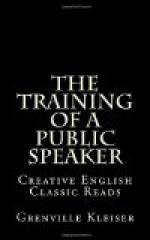With good reason, therefore, is he said by his contemporaries to reign at the bar, and he has so far gained the good graces of posterity that Cicero is now less the name of a man than the name of eloquence itself. Let us then keep him in view, let him be our model, and let that orator think he has made considerable progress who has once conceived a love and taste for Cicero.
Caesar
If Caesar had made the bar his principal occupation, no other of our orators could better have disputed the prize of eloquence with Cicero. So great is his force, so sharp his wit, so active his fire, that it plainly appears he spoke with as much spirit as he fought. A wonderful elegance and purity of language, which he made his particular study, were a further embellishment of all these talents for eloquence.
Philosophers
It remains only to speak of those who have written on subjects of philosophy. Hitherto we have had but few of this kind. Cicero, as in all other respects, so also in this, was a worthy rival of Plato. Brutus has written some excellent treatises, the merit of which is far superior to that of his orations. He supports admirably well the weight of his matter, and seems to feel what he says. Cornelius Celsus, in the manner of the Skeptics, has written a good many tracts, which are not without elegance and perspicuity. Plancus, among the Stoics, may be read with profit, for the sake of becoming acquainted with the things he discusses. Catius, an Epicurean, has some levity in his way, but in the main is not an unpleasing author.
Seneca
I have designedly omitted speaking hitherto of Seneca,—who was proficient in all kinds of eloquence,—on account of the false opinion people entertained that I not only condemned his writings, but also personally hated him. I drew this aspersion upon myself by my endeavor to bring over eloquence to a more austere taste, which had been corrupted and enervated by very many softnesses and delicacies. Then Seneca was almost the only author young people read with pleasure. I did not strive to exclude him absolutely, but could not bear that he should be preferred to others much better, whom he took all possible pains to cry down, because he was conscious that he had taken to a different manner from their way of writing, and he could not otherwise expect to please people who had a taste for these others. It was Seneca’s lot, however, to be more loved than imitated, and his partizans run as wide from him as he himself had fallen from the ancients. Yet it were to be wished that they had proved themselves like, or had come near, him. But they were fond of nothing in him but his faults, and every one strove to copy them if he could. Then priding themselves on speaking like Seneca, of course they could not avoid bringing him into disgrace.
His perfections, however, were many and great. His wit was easy and fruitful, his erudition considerable, his knowledge extensive—in which last point he sometimes was led into mistakes, probably by those whom he had charged to make researches for him. There is hardly a branch of study on which he has not written something; for we have his orations, his poems, epistles, and dialogs. In philosophic matters he was not so accurate, but was admirable for his invectives against vice.




